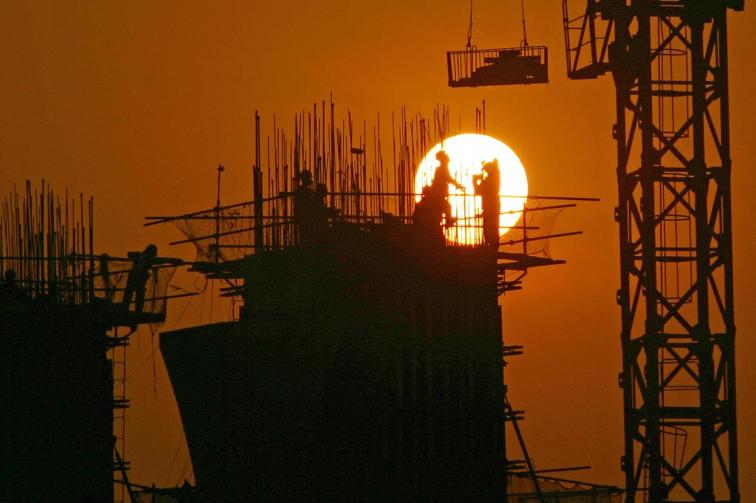On March 4, 2025, He Weidong attended the Chinese People's Political Consultative Conference. (Photo credit: Pedro Pardo/AFP via Getty Images)
[People News] On June 30, after a 65-day interval, the Chinese Communist Party (CCP) finally held another Politburo meeting. At the end of the official Xinhua report, as always, it casually noted, “The meeting also discussed other matters,” and then abruptly ended. Historically, those “other matters” almost always refer to personnel reshuffles. The following day, July 1, the CCP announced that Ma Xingrui would no longer concurrently serve as Party Secretary of Xinjiang, and that Chen Xiaojiang would replace him. However, the treatment of CCP Central Military Commission (CMC) Vice Chairman He Weidong—who has been missing for four months—was notably absent from these “other matters.”
The state media’s 344‑word report on the Politburo meeting spent nearly the entire length detailing the “Regulations on the Working Mechanism of the Party Central Decision‑Making and Coordination Apparatus.” The vague phrase “the meeting also discussed other matters” left everyone wondering—what exactly were those “other matters”? The answer emerged the next day.
On July 1, Xinhua reported that the Party Central Committee had decided that Ma Xingrui would no longer serve concurrently as Xinjiang’s Party Secretary, member of the standing committee, or committee member, and that Chen Xiaojiang would assume those roles.
If you follow the CCP closely—its Politburo meets roughly monthly—you’ll notice that almost every post-meeting official statement ends with “the meeting also discussed other matters.”
This pattern is confirmed statistically. Since the 18th Party Congress, in 33 Politburo communiqués, only two—excluding one special meeting devoted to reviewing implementation of the Central Eight-Point Regulation—omitted “other matters.”
In the CCP’s opaque political system, what do these mysterious “other matters” refer to?
Professor Wang Yukai of the China National Academy of Governance explained that “other matters” often involve issues not directly related to the main agenda but still very important, “more often concerning personnel issues.” Typically, after that brief phrase, authoritative outlets like Xinhua promptly provide updates with specifics.
On July 29, 2014, after a Politburo meeting announced plans for the Fourth Plenum of the 18th Central Committee, the “other matters” revealed the start of the formal investigation into Zhou Yongkang.
On July 20, 2015, the Politburo meeting announcement for the Fifth Plenum of the 18th Central Committee included “other matters” which referred to the approval of the investigation report on Ling Jihua’s serious disciplinary breaches—leading to his expulsion from the Party and public office, and referring of criminal matters to judicial authorities.
By CCP convention, the appointment or removal of sub-provincial officials is decided by the Politburo Standing Committee, while those at or above provincial-ministerial level require approval via the full Politburo meeting. Thus, the “other matters” often include the appointment or removal of full provincial-level officials.
Regarding the June 30 Politburo meeting, besides the personnel changes involving Ma Xingrui and Chen Xiaojiang, was there anything else that should have been announced?
CMC Vice Chairman He Weidong has been missing since March. No official information has emerged regarding his status. Observers expected the Politburo meeting to announce what had become of him, but this “shoe has not dropped.”
As the third-ranking official in the military, He Weidong’s situation is of great significance. Rumours suggest he may be dead or under investigation. The authorities have remained tight-lipped—no confirmation, no denial, no explanation—though speculation abounds.
On March 24, independent commentator Cai Shenkun reported that He was undoubtedly in trouble and that the military had issued an internal notice to theatre-command-level generals.
On April 10, the Financial Times, citing informed sources, said that He Weidong had been dismissed for corruption and placed under detention and investigation, reportedly more severe than the suspension of Miao Hua.
On May 24, Cai added that He was detained after the Two Sessions, initially held at the 301 Hospital, then transferred to Baoding. Strangely, by mid-May, all guards guarding him had returned to Beijing, and so had the chef responsible for his meals.
According to Cai, his sources said He died on May 2 while at 301 Hospital.
On June 30, Cai Shenkun again cited the leak that He Weidong was indeed dead. The source claimed that during the Lunar New Year holiday, He accepted money from old subordinates at the Bayi Building, angering Xi Jinping. Investigators also found he had secretly undergone a kidney transplant without reporting it to Xi, raising further suspicion. After the incident, He repeatedly requested to meet Xi but was repeatedly denied.
Cai said, “He had too much trouble; even by the Fourth Plenum, there may be no official announcement.”
In the CCP’s shadowy political realm, countless dark secrets and hidden histories are kept under wraps. Behind every official, there’s likely a dramatic story—yet the Party suppresses them with vagueness. Those familiar with CCP politics know: “The fewer the words, the bigger the matter.” The fact that the authorities have not quietly whispered a single word about He Weidong underscores just how serious his case might be. We’ll have to wait and see.
(First published by The People News)











News magazine bootstrap themes!
I like this themes, fast loading and look profesional
Thank you Carlos!
You're welcome!
Please support me with give positive rating!
Yes Sure!